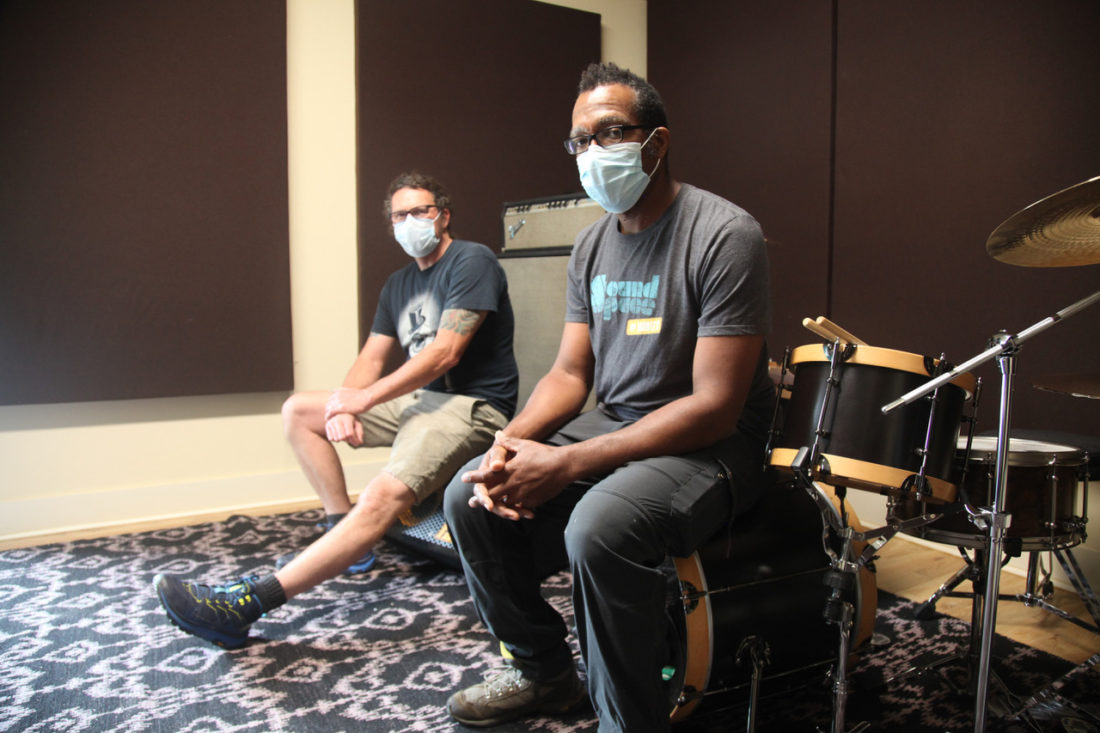“I believe that opportunity is everywhere at all times,” says J Hackett, who co-owns Grind Coffee Co. in the River Arts District with Gene Ettison. “We just have to recognize it.”
Turning opportunity into business success, however, has historically been more difficult for Hackett and other Black entrepreneurs than for their white counterparts.
Citing a report by Dwight Mullen’s State of Black Asheville project (which draws on data from the U.S. Census Bureau), Hackett notes that local Black workers still earn 70% less than white workers. There’s also the 2018 study conducted by Denver-based BBC Research and Consulting which found that 0.5% of city contracts went to Black-owned businesses between 2012 and 2017. The latter study prompted the Asheville City Council in November 2020 to adopt a business inclusion policy to help boost minority contracting — a move that Hackett applauds but notes is only one piece of the ongoing struggle for equity.
“As with any marginalized community that’s coming into some structure that was not set up for them to benefit, there is a type of good old boys club,” Hackett says, pointing to a lack of information for minority entrepreneurs about available resources.
Furthermore, many business owners of color are “overcoming intergenerational poverty,” meaning that early-stage funding help from friends and family members is rarely an option for Black entrepreneurs. Rather, says Hackett, “You just hustle until it becomes a business.”
Indeed, Hackett says he and Ettison “bootstrapped” the expenses for Grind, using individual savings from their prior businesses and “just committed to doing it.” From there, he credits landlords Randy Shull and Hedy Fisher for providing “great terms” and only requiring a portion of the initial lease payments up-front. Likewise accommodating was local Black carpenter Exly Lewis, who allowed the Grind team to pay half the cost of the build-out at the project’s outset and the rest in installments.
“We negotiated terms for our initial supplies and thought to push as much traffic as possible to the [Sept. 26] grand opening in order to recoup costs,” Hackett says. “It was a success. The momentum allowed us to pay all our bills and prepare for the next few months.”
Sense of duty
Having navigated the tricky startup phase, Hackett says he feels it’s important to share the benefits of the support he’s received with others. Grind allows business owners of all colors to use its brick-and-mortar location as a corporate address (which Hackett says helps entrepreneurs access credit), rent mailboxes and use in-house print services.
Claude Coleman Jr., co-owner of the new SoundSpace@Rabbit’s Music Rehearsal Studios, feels a similar sense of duty to pass along the knowledge he’s gained on his entrepreneurial journey while also honoring and building upon Asheville’s Black business history. Part of that motivation stems from how he acquired the former Rabbit’s Motel at 109 McDowell St., which the SoundSpace website describes as “a crown jewel of Black-owned tourist courts for African American travelers in the segregation-era South.”
Upon learning of the property’s rich history, Coleman wrote to owner Louella Massey Byrd laying out his ideas for SoundSpace. He and business partner Brett Spivey, who is white, envisioned a hub for musicians and artists, complete with a soul food kitchen like the motel once had. Though she’d already received two cash offers, Byrd was so moved by the proposal that she put Coleman and Spivey ahead of the competition.
“We’re all about carrying over the opportunity that was bestowed upon us, that was bestowed upon the original owners, which was connected to these beautiful communities — these Black communities that have been forgotten but were full of Black prosperity,” Coleman says.
“The Block downtown was one of the biggest Black-owned business districts in the South,” he continues. “That was our Black Wall Street, and we had many amazing Black communities — streets lined with hotels and drive-ins and funeral homes and so forth.”
After a soft opening in mid-October to iron out the inevitable wrinkles, SoundSpace officially began operations on Dec. 5. Coleman says a “trickle” of bookings has increased over the past two months despite the restrictions and precautions necessitated by the COVID-19 pandemic. He sees the uptick in volume and the community’s enthusiasm for the project as harbingers of success for both SoundSpace and other local Black-owned businesses, a big-picture goal that Coleman believes will benefit all residents.
“I think it creates the truest and most honest and natural form of diversity for a community which is a bit lacking in diversity. It’s connecting people through art, music, food, culture — whatever it is,” he says. “And I think, certainly, with the creation of new Black businesses, it’s going to bring in new classes of travelers and tourists and people interested in those communities from other areas, and that can only be a great thing. And I think what that’ll end up doing is create a real sort of vision of America in Asheville — not so one-sided toward one community or the other.”
Experience matters
During his decade-plus of owning and operating McKnight Tire at 395 Haywood Road, Robert McKnight witnessed the kind of consistent, intentional community support that Hackett and Coleman cite as likely drivers to their fledgling businesses’ future success. He adds that the Glenn Queen family, which owns the property, wanted to see the auto repair shop succeed and maintained an affordable rent, only raising the amount by $100 in the last few years to keep up with rising property taxes.
McKnight says he would probably still be fixing cars if his father Willie McKnight’s heart condition hadn’t worsened. But the strain of caring for his father (who passed away in late January) and running the shop gradually became overwhelming. McKnight Tire closed in 2019, leaving that part of town with only a handful of Black-owned businesses.
The property has since been renovated, and Cellarest Beer Project will soon open in McKnight’s old spot (see “Good neighbors,” Xpress, Dec. 23, 2020). McKnight doubts the new business will see much patronage from the Black community, which he estimates comprises “more than 50% of West Asheville” and largely steers clear of breweries and many other types of business being added to Haywood Road. Factor in the rising cost of real estate, and he says it feels like recent shifts are “pushing the community out.”
“[Those kind of businesses] are making money, but they’re not relying on the [Black] community dollar. Then you’ve got the African American community having to push out and go elsewhere, all over town, instead of being right in their neighborhood,” McKnight says. “It’s kind of crazy, because the Black dollar doesn’t circulate that long in the Black community.”
Keep it going
While McKnight Tire is gone, Hosea Jackson’s Haywood Lounge continues to see steady to-go business from loyal customers. Jackson says his clientele has become dramatically more diverse since he transitioned the private club to a restaurant specializing in chicken wings in 2014, going from roughly an 80/20 Black/white split to nearly 50/50. He notes the change coincided with West Asheville’s overall rise in popularity and an increase in the number of businesses on Haywood Road, which led to big bump in foot traffic.

“Everybody had an idea of what my business was because it’s Black-owned. They were speculating, ‘It’s this, it’s that,’” Jackson says. “The food brought the diversity in. It’s kind of weird that food can be so powerful. The people who wouldn’t normally probably stop stopped and became a customer.”
Jackson began leasing the space as a youngster of 19 in 1998 and purchased the property in 2011. Considering the skyrocketing rents of the past decade, Jackson says he’s not sure he’d still be in business if he hadn’t bought when he did. And like his peers, he believes it’s his duty to share his hard-won knowledge with other prospective Black entrepreneurs.
What really keeps him in the game, however, is the prospect of passing on the business to his children in the future. Despite the sizable profit he stands to gain from selling, he likes the idea of continuity.
“It’s always been important for me to stay in the community, and I hope that if my kids were to take it over, they’ll hold it in the community, too,” Jackson says. “Who knows? They’ve got so many ideas. They’re so ready for business right now. It’s totally up to them, but that’s what I ask — that they keep it the same and keep it going.”




Before you comment
The comments section is here to provide a platform for civil dialogue on the issues we face together as a local community. Xpress is committed to offering this platform for all voices, but when the tone of the discussion gets nasty or strays off topic, we believe many people choose not to participate. Xpress editors are determined to moderate comments to ensure a constructive interchange is maintained. All comments judged not to be in keeping with the spirit of civil discourse will be removed and repeat violators will be banned. See here for our terms of service. Thank you for being part of this effort to promote respectful discussion.